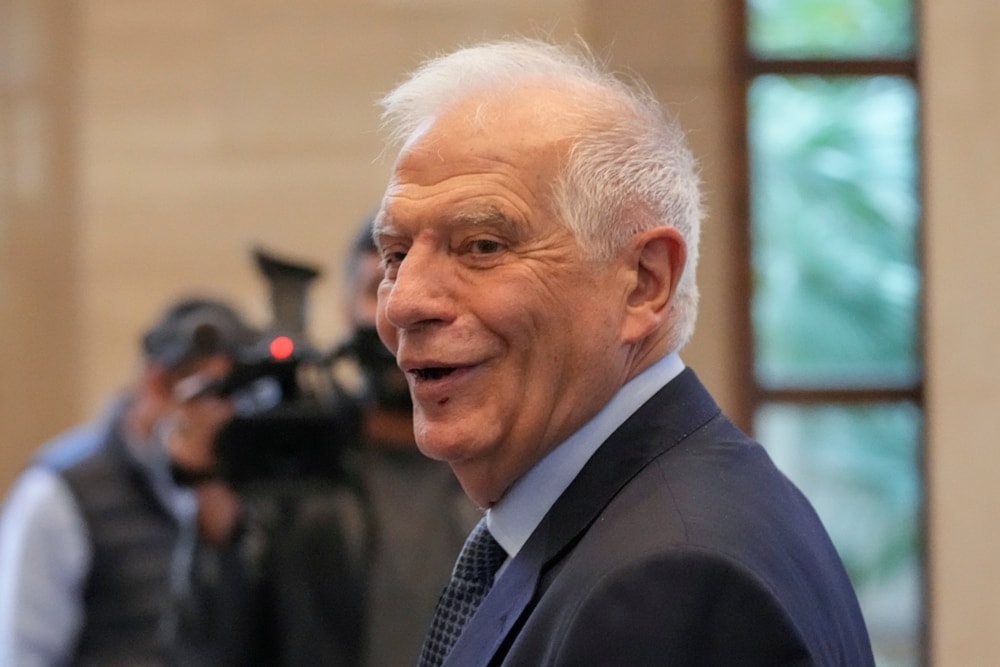Borrell admits criticism of Europe 'double standards' on Ukraine, Gaza
The EU foreign policy chief says the bloc's failure to act decisively in Gaza has contributed to this global criticism, even though most EU citizens do not share this view.
-

European Union foreign policy chief Josep Borrell gestures as he arrives for a meeting with Lebanese Parliament speaker Nabih Berri, in Beirut, Lebanon, on November 24, 2024. (AP)
European Union foreign policy chief Josep Borrell acknowledged criticism of the European Union's "double standards" regarding its response to the wars in Ukraine and Gaza.
He explained that this criticism, particularly from the Global South, highlights the EU's inconsistent stance on these wars.
In a blog post reflecting on his five-year tenure, Borrell noted that the EU has struggled to present a unified response to the Gaza crisis, particularly after October 2023, when "Israel" launched an offensive.
Double standards
Borrell admitted that the EU's "deep divisions" have hindered its ability to influence events in Gaza, despite the rising number of civilian casualties, which has exceeded 44,000.
He stated, "This impotence and passivity, in contrast to the vigour of our commitment in support of Ukraine, have often been perceived outside the Union as the sign of a ‘double standard'." Borell added, "In the eyes of Europeans, the life of a Palestinian would not be worth as much as that of a Ukrainian."
He also observed that this perception is widespread not only in Muslim countries but also across Latin America and Sub-Saharan Africa. The EU's failure to act decisively in Gaza, Borrell concluded, has contributed to this global criticism, despite the fact that most EU citizens do not share this view.
Borrell urges EU member states to respect ICC decisions
Earlier, on Thursday, Borrell urged all EU member states to abide by the International Criminal Court's rulings, particularly the arrest warrant issued against Israeli occupation Prime Minister Benjamin Netanyahu.
Borrell told journalists, "We cannot undermine the International Criminal Court. It is the only way of having global justice," explaining that the court is not political but rather "a legal body formed by respected people who are the best among the profession of judges."
Though all EU member states have signed the ICC's founding treaty, France on Wednesday backtracked on its commitments to the court and announced that it would not detain Netanyahu and former Security Minister Yoav Gallant despite the arrest warrants issued against them.
France decided to retain the Israeli officials' freedom on its lands, citing "historically cordial relations" that linked it to "Israel", as well as the occupation and its own alleged "respect for professional and independent justice, and the integrity of the law."
Italian Deputy Premier, Transport Minister, and far-right League party leader Matteo Salvini also declared that Israeli Prime Minister Benjamin Netanyahu would be warmly welcomed in Italy, despite the recent war crimes charges leveled against him by the ICC.
"I plan to meet with members of the Israeli government soon, and if Netanyahu came to Italy, he would be welcome. The war criminals are others," Salvini stated, dismissing the ICC's decision. He criticized the label of "war criminal" as "disrespectful" for "the prime minister of one of the few democracies in the Middle East."
Salvini's remarks come amid a wave of reactions to the ICC's decision. Hungarian Prime Minister Viktor Orban also rejected the charges, inviting Netanyahu to Budapest as a symbolic challenge to the court's ruling.
Orban's invitation echoed Salvini's sentiment, signaling a growing rift between some European right-wing leaders and the international judicial body.
The arrest warrant against Netanyahu and his former Security Minister for war crimes committed in Gaza has intensified debates on international law and the role of Western leaders in supporting war criminals.

 4 Min Read
4 Min Read








